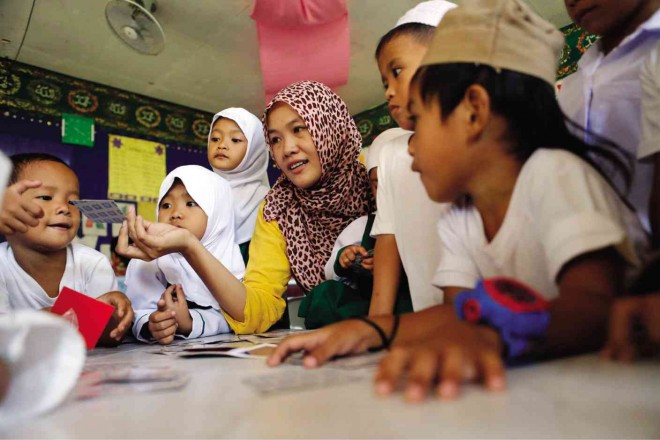Half an hour before the class starts at the Tahderriyah (preschool/kindergarten), the Madrasah Nor-Faidah Al-Islamiah in Mable, Malabang, Lanao del Sur province, is already filled with excited children.
Brothers Almar, 4, and Al-Faiz, 5, are accompanied by their grandfather, Haji Mohmin Camid, who says the boys are excited to go to school.
At 7:30 a.m., Montia Amor, Teacher Lala to the students, ushers the children into a clean classroom, its walls plastered with colorful charts and artwork.
Outside, Camid, president of the Madrasah Nor-Faidah Al-Islamiah in Mable, and the parents observe the class through a window.
Amor begins with morning prayers, then proceeds to the day’s lesson on matching colors and objects.
After class, Camid meets his grandsons outside and asks them to recite the new words they learned in class.
High dropout rate
In the Autonomous Region in Muslim Mindanao (ARMM), decades of conflict and underinvestment have
resulted in less than 40 percent of students completing a school year.
Although more data is needed, the UN Children’s Fund (Unicef) and other key education groups believe 3- to 5-year-olds in ARMM have little or no access to early learning.
Of Mindanao’s total population of 21.58 million, about 621,500 are aged 3 to 4. Some 236,170 children are in ARMM.
There are only 4,000 government-supported daycare centers (DCC) in Mindanao and only 841 are in ARMM.
This means every DCC in Mindanao has an average of 155 children. The average is 280 per DCC in ARMM.
In other parts of the country, a rural area DCC averages 40 children, while the urban area average is 80.
The Tahderriyah is one of the peace and development programs in Mindanao supported by Unicef and endorsed by the Department of Education. The program enables children in target Bangsamoro communities to receive culturally responsive early childhood care and development (ECCD) services, complemented by Water, Sanitation and Hygiene (WASH), and child protection programs.
The project grew out of Days of Peace, a mass service delivery campaign launched in 2007 with the support of Unicef, the Moro Islamic Liberation Front (MILF), Bangsamoro Development Agency and the Philippine government.
The campaign aimed to provide services to children in conflict-torn communities. Initial focus was on micronutrients and immunization. It later included distribution of ECCD materials.
Unicef and the MILF signed a joint action plan that called for deliberate and sustainable efforts to increase ECCD services in conflict-affected communities through Tahderriyah classes. A culturally sensitive curriculum supporting quality early learning was developed and piloted in 13 sites.
Continuous improvements ensured that the program followed child development principles and practices, and was aligned with universal human rights.
Now on its third phase, the program has reached at least 20,482 children in 813 targeted Tahderriyah sites. Hundreds of teachers and administrators have been trained on the curriculum, child development, classroom and school management, child protection and WASH.
Child protection network
Basic teaching and learning materials and child-size furniture have been distributed to 500 Tahderriyahs. A total of 16 community-based child protection networks have been established, reaching nearly 6,800 community members.
Yul Olaya, Unicef Philippines education specialist, says Tahderriyahs help build peace in Mindanao in several ways. It impacts children at a time when the brain is developing rapidly, habits are formed, differences are recognized and emotional ties are built. Young children learn critical emotional skills that will influence their future and foster more peaceful communities.
Olaya says Tahderriyahs bridge communal divides and allow families and communities to develop collective visions based on the children’s needs.
Schools give the best start to young children in depressed, disadvantaged, strife-torn communities, he says.
The Tahderriyah curriculum blends Bangsamoro values and principles of early childhood and development,
enhancing learning competencies of young children.
The curriculum’s emphasis on hygiene and sanitation prompted the Parents Mudaris Association to support the construction of a hand-washing facility. Unicef provided the supplies.
Amor says her training taught her that the best way to teach children was to gain their trust. Scare tactics do not work, she says.
She says the availability of teaching materials is a big help, making learning fun.
With the positive feedback it has been getting, enrollment in the Tahderriyah is at its highest this year, with 24 children, aged 3 to 5, enrolled in a class that runs from Sunday to Thursday.
